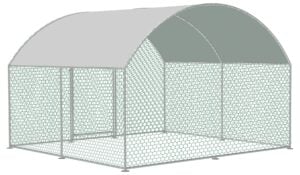Drinking Water Quality For Poultry
As a poultry keeper it’s absolutely essential that you understand just how important water is to the health and wellbeing of your chickens. Water is involved in every aspect of a chicken’s metabolism; it plays an essential role in regulating the bird’s body temperature, food digestion and the elimination of waste from the body.
Water is the most important ingredient in a bird’s diet and you should have adequate accessories available. Around 50% of a bird’s body is made up of water and eggs are around 65% water, meaning it’s absolutely vital that your flock have access to clean, fresh drinking water at all times.
Dirty or contaminated drinking water can be dangerous to many animals, but when it comes to poultry, owners have to be particularly careful as chickens can contract a number of diseases from poor quality water including:
- Thrush from drinking water contaminated with fungus
- Botulism from drinking water that contains decaying organic materials
- Algae poisoning due to dangerous toxins in the water
How to Ensure the Quality of Drinking Water
For starters, you need to test the supply of water to ensure it’s of a high quality. Your local vets are often able to test the water quality for you; alternatively you can test it yourself with your own water sample test kit which can normally be purchased online.
General Water Care
As you would expect to do with any pet, you should replace waterers and containers with fresh water on a daily basis, regardless of whether they are empty or not. It’s also very important that you keep all water containers clean, regularly scrubbing them with a stiff hand or wire brush before refilling them.
Regular cleaning is great but you also need to make sure you sanitise containers thoroughly every couple of weeks. This can be done through the use of sanitising tablets or soaking containers in disinfectant – always check what’s in cleaning products to ensure they don’t contain any chemicals that could harm your birds.
Changes in temperature:
In winter, depending on where you are, frosts can be a daily occurrence, during really cold months you must defrost frozen water several times a day to ensure that your flock has a continues supply of fresh water.
When a chicken is at normal body temperature, it will drink twice as much water as it will eat food. During the summer months, when body heat increases, a chicken’s water consumption can double and quadruple so keepers need to extra vigilant, making sure there is an abundant water supply available in hot weather.
Change in Water Supply:
Birds can be very sensitive to the type of water they drink and do not cope well with a change in their water supply. This is something to bear in mind, particularly for those looking to show their birds or temporarily move them for any reason. If you’re planning anything like this then it’s always worth considering taking your own supply of water with you to ensure your chickens are still getting the hydration they need.
Dehydration:
If chickens are not given an adequate water supply a number of diseases and health issues can arise including gout, salt poisoning and severe dehydration.
Birds who are deprived of food can survive for a while but without water they do not last long at all. If a chicken is without water for just 24 hours you will notice that, when mobile, they will stagger around before becoming very lethargic and quiet.
What to Do if You Have a Dehydrated Bird:
If you are concerned one of your chickens is suffering from dehydration then you must ensure they consume clean, fresh water as soon as possible. If the bird is unable to drink for themselves then you can carefully syringe feed them. Squirting water slowly into their mouth will allow them to swallow for themselves and also ensure the water goes down the right channel.
Dehydration can pose a very serious risk to chickens, once rehydrated it can still take them several weeks to fully recover and you may have to wait up to 2 weeks before they will start laying again.




